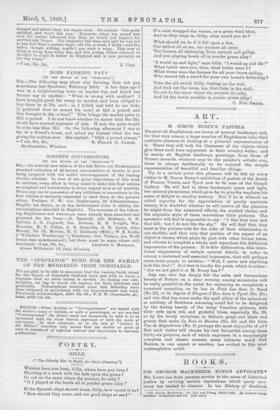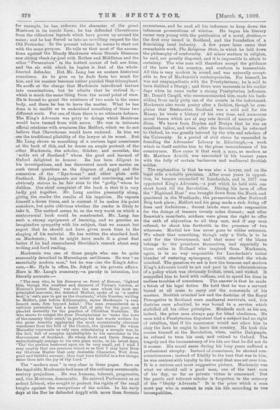BOOKS.
SIR GEORGE MACKENZIE, KING'S ADVOCATE.* MR. LANs has done yeoman service to the cause of historical justice by reviving certain reputations which party acri. mony has tended to obscure. In his History of Scotland, Sir George Maxkeneie : his Ws and rims, 1086(?)./691. By Andrew Lang. London; Longman', and Co. [lbs. net.]
for example, he has redrawn the character of the great Montrose in its heroic lines ; he has defended Claverhonse from the ridiculous legends which have grown up around his name; and be has forced us into an unwilling respect for the Old Pretender. In the present volume he seems to start out with the same purpose. He tells us that most of the accusa- tions against the Bloody Mackenzie whom Steenie Steenson saw sitting cheek-by-jowl with Rothes and Middleton and the other " Persecutors " in the hottest corner of hell are false, and the air with which he begins is that of the whole- hearted defender. But Mr. Lang has an austere historical conscience. As ho goes on he finds facts too much for him, and his manner becomes rather puzzled than triumphant.
He scoffs at the charge that -Mackenzie introduced torture into examinations, but he admits that he revived it,— which is much the same thing from the moral point of view. He is forced to grant the existence of two souls in the same body, and there he has to leave the matter. What he has done is to enable us to understand something of these two different souls. For one of them there is no ultimate defence. The King's Advocate was privy to doings which Montrose would have turned from with scorn. He was in intimate official relations with creatures like Melfort, which we do not . believe that Olaverhouse would have endured. In him we see the traditional pliability of the lawyer at its worst. But Mr. Lang shows us something of a curious legal conscience at the back of this, and he draws an ample portrait of the other Mackenzie, the scholar, thinker, and moralist, the ` noble wit of Scotland " whom the good and learned of Oxford delighted to honour, Re has been diligent in his investigations, and has discovered much new matter on such vexed questions as the disgrace of Argyll and the connexion of the "Rye-house" and other plots with Scotland. His judgments are sober and convincing, and he obviously strives to be fair even to the "godly," whom he dislikes. Our chief complaint of the book is that it is very .badly put together. Mr. Lang ambles pleasantly along, giving the reader the results of his inquiries. He repeats himself a dozen times, and is content if he makes his point somehow, but quite oblivious whether the reader is likely to .take it. The method seems to us the very worst on which a controversial hook could be constructed. Mr. Lang has such a strong • equipment of learning, and so genuine an imaginative sympathy with his subject, that we cannot but .regret that he should not have given more time to the shaping of his material. He has written the standard book on Mackenzie ; but he -might have made it a great deal better if he had remembered Sheridan's remark about easy writing and hard reading.
Mackenzie was one of those people who can be quite reasonably described in Macaulnyan antitheses. He was " an essentially modern man," but he was e.lso the King's Advo- cate,—Mr. Hyde in office, Dr. Jekyll in his private affairs. Here is Mr. Lang's stunmary,—a parody in intention, but literally accurate
The man who, in his Discourse on Point of Honour, 'lighted this, though the smallest and dimmest of Virtue's torches, at Honour's purest flame,' was also the man whom his most un- principled associate, the detested Melfort, spoke of as 'a useful tool,' a cat's paw to get us the chestnuts,' while Dundee, writing to Melfort, just before Killiecrankie, styles Mackenzie 'a very honest man; firm beyond belief.' The man remembered as a ruthless persecutor had a heart full of pity for the poor, and pleaded earnestly for the practice of Christian Socialism. Ho who strove to compel the dour Presbyterians to 'make the laws of tho country their creed,' in perhaps his last words written for the press heartily applauded the most eccentrically aberrant wanderers froth the fold of the Church, the Quakers. He whom Macaulay represents as only once entertaining a scruple was, to the last, full of scruples unintelligible to his associates in the Government of Scotland. Ho whom Scott and Davie Deans so unhesitatingly consign to his own place wrote, in his latest days, Tho' the portion bestowed upon me be very small, yet I wish I may employ that one precious talent so as that I may have from my Glorious Master that only desirable Character, Well done, good and faithful servant; thou bast been faithful in a few things, enter thou into the joy of thy Lord.'" The "modern man" is very clear in these pages. Save on the legal side, Mackenzie had none of the ordinary seventeenth- century prejudices. He was humane, tolerant, progressive, and, like Montrose, democratic. He entered Parliament as an
ardent Liberal, who sought to protect the rights of the small burghs against the usurpations of the nobles. In his early days at the Bar he defended Argyll with more than forensic
earnestness, and he used all his influence to keep down the infamous prosecutions of witches. He began his literary career very young with the publication of a novel, Aretina,— the first ever issued in Scotland, and the foundation of a flourishing local industry. A. few years later came that remarkable work, The Religious Stoic, in which he laid down the philosophy of conformity. All minor matters in religion, he said, are greatly disputed, and it is impossible to attain to certainty. The wise man will therefore accept the guidance of the laws of his country, and conform in inessentials. All this is very modern in sound, and was naturally accept- able to few of Mackenzie's contemporaries. For himself, ho was not unsympathetic with the Presbyterians; he is said to have disliked a liturgy ; and there were moments in his earlier days when he came under a strong Presbyterian influence. Mr. Donald Cargill, who excommunicated him, made his back- sliding from early piety one of the counts in the indictment. Mackenzie also wrote poetry after a fashion, though he com- plains that Restoration Scotland was a cold soil for the Muses; he wrote a history of his own time, and numerous moral theses which are at any rate devoid of narrow preju- dices. We know from Dryden and Evelyn that he was an excellent talker, and when after the Revolution he returned to Oxford, he was greatly beloved by the wits and scholars of the University. In a period of civil stress he succeeded in founding the Advocates' Library in Edinburgh,--a work which in itself entitles him to the pious remembrance of his countrymen, How came it that such a man, as modern as Mr. Matthew Arnold, was associated in his busiest years with the folly of certain barbarous and mediaeval Scottish nobles.
The explanation is that he was also a lawyer, and on the legal side a notable precisian. After some years in opposi- tion, he became reconciled to Lauderdale, and in 1G77 was appointed King's Advocate,—a post which he held with one short break till the Revolution. During his term of office the "Highland Host" was brought down from the North and quartered in the Westlands ; the persecutions after Bothwell Brig took place ; Melfort and his gang made a rich living off fines and forfeitures ; decent lairds were made responsible for the doings of tenants twenty miles distant ; and after Renwiok's manifesto, soldiers were given the right to offer the oath of abjuration to all they met, and if any man refused, to shoot him forthwith in the presence of two witnesses. Martial law has never gone to wilder extremes. We admit that something, though only a little, is to be said for the Government, and that some of the blame belongs to the preachers themselves, and especially to those exiles in Holland who inspired them. Mackenzie, again, is in no way responsible for Lauderdale's initial blunder of restoring episcopacy, which started the whole mischief. The question we ask is how the humane and modern King's Advocate could be art and part in the administration of a policy which was obviously foolish, cruel, and wicked. It compelled him to herd with ruffians, and to spend his time in endless troubles of conscience. The answer is that he made a fetish of his legal duties. He held that he was a servant bound at all costs to carry out the commands of his masters. Scottish criminal law and the doctrine of the Royal Prerogative in Scotland were mediaeval survivals, and, this doctrine once admitted, he was bound to a service which stultified all his other principles. Misdeeds such as his are, indeed, the price men always pay for blind obedience, He once told a Presbyterian disputant that a subject had no right of rebellion, that if his conscience would not allow him to obey the laws he ought to leave the country. He took this course himself at the Revolution, when, unlike Dalrymple, he refused to turn his coat, and retired to Oxford. The tragedy and the inconsistency of his life are that he did not do it sooner. His moral sense during his busy years suffered a professional atrophy. Instead of conscience, he showed con- scientiousness; instead of fidelity to the best that was in him, he was content with loyalty to the worst that was set over him. It is a curious and most suggestive picture. Mackenzie was what we should call a good man, one of the hest men of his day, so far as private virtue is concerned. But the gentle and tolerant scholar is forgotten in the memory of the " bluidy Advocate." It is the price which a man must pay who is content to rule his life according to two incompatibles.















































 Previous page
Previous page